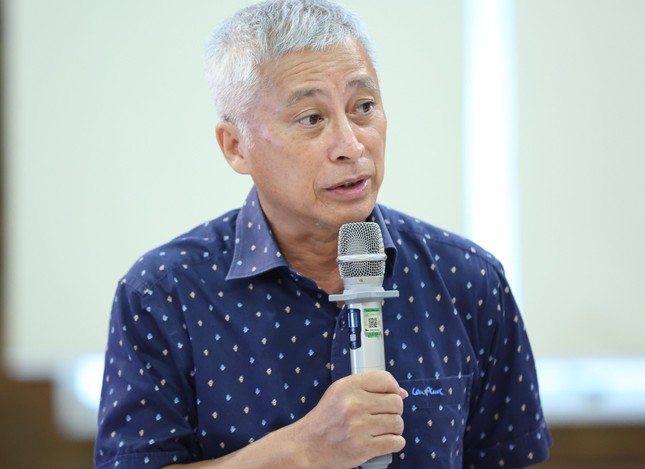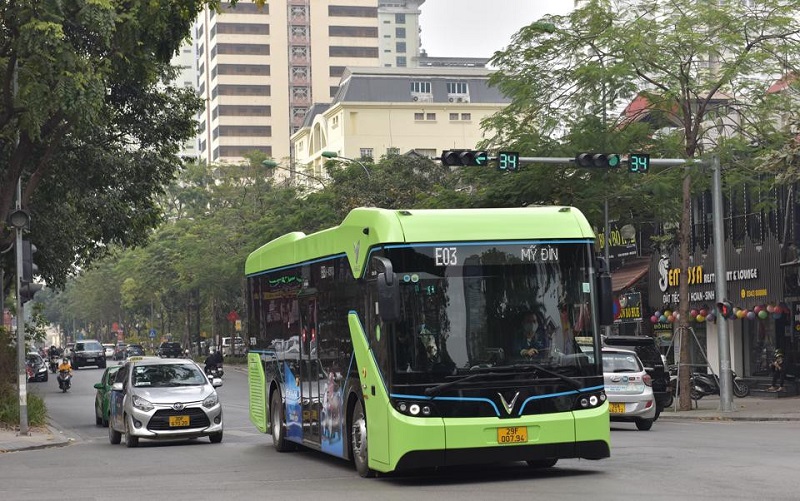Conversion of all fuel buses to electric and gas buses to benefit Hanoi
Hoang Duong Tung, Chairman of the Vietnam Clean Air Network, calls for greater efforts to make Hanoi's entire bus fleet electric by 2030.
Hanoi plans to replace all fossil fuel buses with gas and electric buses by 2030, as the city seeks to make its transport greener and more environmentally friendly. The plan will cost the city an estimated VND43 trillion ($1.7 billion).
Hoang Duong Tung, Chairman of the Vietnam Clean Air Network, talked to Vietnamnet e-newspaper about the program's feasibility.
| Hoang Duong Tung, Chairman of the Vietnam Clean Air Network. |
What are your thoughts on Hanoi's three options for its bus fleet conversion program?
The Hanoi government has forwarded to the city's People's Council a three-phase plan to convert the local bus fleet to make public transportation more environmentally friendly. I think this is a great move as the city is trying to get rid of vehicles that are too high in fossil fuel consumption and introduce electric and gas-powered buses, which are considered to be less polluting.
The Hanoi Department of Transport has outlined three scenarios for the transition to electric and green energy buses between 2026 and 2030: a fleet of 100% electric buses, or 70% electric and 30% LNG/CNG buses, or 50% electric and 50% LNG/CNG buses.
I think it's necessary to present the scenarios for discussion and analysis. Every scenario has pros and cons. When we see electric buses on the street, we hope that one day, all buses will be electric because they are clean, aesthetically pleasing, and good for the environment.
What about electric taxis? Do you think Hanoi should encourage companies to convert gasoline fleets to electric?
It is my opinion that all public transportation vehicles should be electric, not just taxis. If all taxis were electric, the city would suffer less from noise and pollution.
| VinBus electric bus in Hanoi. Photo: Pham Hung/The Hanoi Times |
Electricity can also be used for other public services, such as garbage collection. Every day, garbage collectors work very hard to collect garbage, fill their carts, and take them to the trucks for loading. If we can find a way to turn these carts into motorized carts, it would make it easier for us to collect garbage, especially if Hanoi takes measures to sort garbage at the source. Adding a motor to the carts will help increase productivity and reduce the workload for sanitation workers.
Electricity can be used for other types of vehicles, such as delivery trucks and mail trucks. If that happens, I think it will be beneficial for the city and its people.
So, if Hanoi manages to implement the scheme, will it change the way people think and commute?
Yes, I think so. The city government has an important role to play in this program. To encourage the conversion of fossil fuel vehicles to electric vehicles, we need more mechanisms than just giving money to bus operators.
For example, in waste collection and segregation, waste collection companies must meet certain technical standards and equipment requirements. If the authorities require them to use environmentally friendly vehicles, they could reaffirm their commitment to the green transition, not only in waste collection but also in public transport.
The authorities in Hanoi need to demonstrate their determination to make the green transition a priority. They need concrete policies instead of just talking through the media. If they can do that, it will benefit the city and businesses, and protect the environment.
I think the city should find a way to encourage people and businesses to join the program. That's better than subsidizing them. The program should be done when people and companies really understand the concept, and that's how sustainability is achieved.
Thank you for your time!
Hanoi plans a US$1.7 billion bus conversion program Hanoi aims to run half of its public buses on electricity and the other half on liquefied natural gas and compressed natural gas by 2030, at a cost of VND43 trillion (US$1.7 billion). This initiative is in line with the Prime Minister's Decision No. 876 of July 22, 2022, which envisages a green energy transition to reduce CO2 and methane emissions in the transport sector from 2022 to 2030. Based on the city's current situation, the Hanoi Department of Transport outlines three options for transitioning to electric and green energy buses between 2026 and 2030: 100% electric bus fleet, or 70% electric and 30% LNG/CNG buses, or 50% electric and 50% LNG/CNG buses. Hanoi now operates 2,034 subsidized buses, of which 277 use clean energy. The city's proposal to promote green and electric buses in Hanoi will be reviewed by the city's People's Council at its 17th session on July 1-4. |













